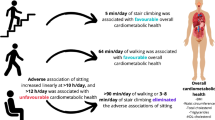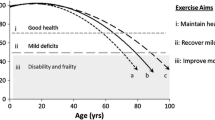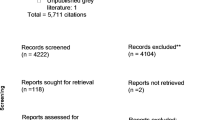Abstract
Prospective memory (PM) is the ability to remember to perform an intended action in the future and is necessary for regular physical activity (PA). For older adults with declining PM, planning strategies may help them to act upon their intentions. This study investigates PM as a moderator in a mediation process: intention predicting PA via planning. A mediated moderation was estimated with longitudinal data of older adults (M = 70 years). Intentions (T1) predicted PA (T3) via action and coping planning (T2). PM was included as moderator on the planning-PA association. Both planning strategies were significant partial mediators (action planning: b = 0.17, 95 % CI [0.10, 0.29]; coping planning: b = 0.08, 95 % CI [0.02, 0.18]). For individuals with lower PM, the indirect effect via coping planning was stronger than with higher PM (b = 0.06, 95 % CI [0.01, 0.16]). Action planning is important for PA in old age regardless of PM performance, whereas older adults with lower PM benefitted most from coping planning. Intervention studies for older adults should consider training PM and promote planning skills.



Similar content being viewed by others
References
Adriaanse, M. A., Vinkers, C. D. W., De Ridder, D. T. D., Hox, J. J., & De Wit, J. B. F. (2011). Do implementation intentions help to eat a healthy diet? A systematic review and meta-analysis of the empirical evidence. Appetite, 56, 183–193. doi:10.1016/j.appet.2010.10.012
Ajzen, I. (1991). The theory of planned behavior. Organizational Behavior and Human Decision Processes, 50, 179–211.
Brom, S., & Kliegel, M. (2014). Improving everyday prospective memory performance in older adults: Comparing cognitive process and strategy training. Psychology and Aging, 29, 744–755. doi:10.1037/a0037181
Carraro, N., & Gaudreau, P. (2013). Spontaneous and experimentally induced action planning and coping planning for physical activity: A meta-analysis. Psychology of Sport and Exercise, 14, 228–248. doi:10.1016/j.psychsport.2012.10.004
Charlson, M., Szatrowski, T. P., Peterson, J., & Gold, J. (1994). Validation of a combined comorbidity index. Journal of Clinical Epidemiology, 47, 1245–1251. doi:10.1016/0895-4356(94)90129-5
Chasteen, A. L., Park, D. C., & Schwarz, N. (2001). Implementation intentions and facilitation of prospective memory. Psychological Science, 12, 457–461. doi:10.1111/1467-9280.00385
Cohen-Mansfield, J., Marx, M. S., & Guralnik, J. M. (2003). Motivators and barriers to exercise in an older community-dwelling population. Journal of Aging and Physical Activity, 11, 242–253.
Conner, M., Sandberg, T., & Norman, P. (2010). Using action planning to promote exercise behavior. Annals of Behavioral Medicine, 40, 65–76. doi:10.1007/s12160-010-9190-8
de Nooijer, J., de Vet, E., Brug, J., & de Vries, N. K. (2006). Do implementation intentions help to turn good intentions into higher fruit intakes? Journal of Nutrition Education and Behavior, 38, 25–29. doi:10.1016/j.jneb.2005.11.021
Einstein, G. O., & McDaniel, M. A. (1990). Normal aging and prospective memory. Journal of Experimental Psychology: Learning, Memory, and Cognition and Emotion, 16, 717–726.
Einstein, G. O., McDaniel, M. A., Williford, C. L., Pagan, J. L., & Dismukes, R. K. (2003). Forgetting of intentions in demanding situations is rapid. Journal of Experimental Psychology, 9, 147–162. doi:10.1037/1076-898X.9.3.147
Evers, A., Klusmann, V., Ziegelmann, J. P., Schwarzer, R., & Heuser, I. (2011). Long-term adherence to a physical activity intervention: The role of telephone-assisted vs. self-administered coping plans and strategy use. Psychology & Health, 27, 784–797. doi:10.1080/08870446.2011.582114
Fuchs, R. (1997). Psychologie und körperliche Bewegung [Psychology and physical activity]. Göttingen: Hogrefe.
Gollwitzer, P. M. (1999). Implementation intentions: Strong effects of simple plans. American Psychologist, 54, 493–503.
Groll, D. L., To, T., Bombardier, C., & Wright, J. G. (2005). The development of a comorbidity index with physical function as the outcome. Journal of Clinical Epidemiology, 58, 595–602. doi:10.1016/j.jclinepi.2004.10.018
Hayes, A. F. (2013). Mediation, moderation and conditional process analysis. New York: Guilford Press.
Henry, J. D., Macleod, M. S., Phillips, L. H., & Crawford, J. R. (2004). A meta-analytic review of prospective memory and aging. Psychology and Aging, 19, 27–39. doi:10.1037/0882-7974.19.1.27
Ihle, A., Hering, A., Mahy, C. E. V., Bisiacchi, P. S., & Kliegel, M. (2013). Adult age differences, response management, and cue focality in event-based prospective memory: A meta-analysis on the role of task order specificity. Psychology and Aging, 28, 714–720.
Kliegel, M. (2004). Gesundheitsverhalten bei chronischen Erkrankungen im höheren Erwachsenenalter [Health behavior in older adults with chronic diseases]. In A. Kruse & M. Martin (Eds.), Enzyklopädie der Gerontologie: Alternsprozesse in multidisziplinärer Sicht (pp. 314–327). Bern: Huber.
Kliegel, M., Altgassen, M., Hering, A., & Rose, N. (2011). A process-model based approach to prospective memory impairment in Parkinson’s disease. Neuropsychologia, 49, 2166–2177.
Kliegel, M., Jäger, T., & Phillips, L. (2008a). Adult age differences in event-based prospective memory: A metaanalysis on the role of focal versus nonfocal cues. Psychology and Aging, 23, 203–208.
Kliegel, M., Martin, M., McDaniel, M. A., Einstein, G. O., & Moor, C. (2007). Realizing complex delayed intentions in young and old adults: The role of planning aids. Memory & Cognition, 35, 1735–1746.
Kliegel, M., McDaniel, M., & Einstein, G. (2000). Plan formation, retention, and execution in prospective memory: A new approach and age-related effects. Memory & Cognition, 28, 1041–1049. doi:10.3758/bf03209352
Kliegel, M., McDaniel, M. A., & Einstein, G. O. (2008b). Prospective memory: Cognitive, neuroscience, developmental, and applied perspectives. Mahwah: Erlbaum.
Leopold, L., & Engelhardt, H. (2013). Education and physical health trajectories in old age. Evidence from the Survey of Health, Ageing and Retirement in Europe (SHARE). International Journal of Public Health, 58, 23–31. doi:10.1007/s00038-012-0399-0
Lindenberger, U., & Baltes, P. B. (1997). Intellectual functioning in old and very old age: Cross-sectional results from the Berlin Aging Study. Psychology and Aging, 12, 410–432.
Little, R. J. A., & Rubin, D. B. (2002). Statistical analysis with missing data. New York: Wiley.
Liu, L. L., & Park, D. (2004). Aging and medical adherence: The use of automatic processes to achieve effortful things. Psychology and Aging, 19, 318–325.
Luszczynska, A., Scholz, U., & Sutton, S. (2007). Planning to change diet: A controlled trial of an implementation intentions training intervention to reduce saturated fat intake among patients after myocardial infarction. Journal of Psychosomatic Research, 63, 491–497. doi:10.1016/j.jpsychores.2007.06.014
Maddux, J. E., & Rogers, R. W. (1983). Protection motivation and self-efficacy: A revised theory of fear appeals and attitude change. Journal of Experimental Social Psychology, 19, 469–479.
Manini, T. M., & Pahor, M. (2009). Physical activity and maintaining physical function in older adults. British Journal of Sports Medicine, 43, 28–31. doi:10.1136/bjsm.2008.053736
McDaniel, M. A., Bugg, J. M., Ramuschkat, G. M., Kliegel, M., & Einstein, G. O. (2009). Repetition errors in habitual prospective memory: Elimination of age differences via complex actions or appropriate resource allocation. Aging, Neuropsychology and Cognition, 16, 563–588.
Milton, K., Bull, F. C., & Bauman, A. (2010). Reliability and validity testing of a single-item physical activity measure. British Journal of Sports Medicine,. doi:10.1136/bjsm.2009.068395
Park, D. C., Smith, A. D., Lautenschlager, G., Earles, J. L., Frieske, D., Zwahr, M., & Gaines, C. L. (1996). Mediators of long-term memory performance across the life span. Psychology and Aging, 11, 621–637.
Reuter, T., Ziegelmann, J. P., Wiedemann, A. U., Lippke, S., Schüz, B., & Aiken, L. S. (2010). Planning bridges the intention-behaviour gap: Age makes a difference and strategy use explains why. Psychology and Health, 25, 873–887. doi:10.1080/08870440902939857
Scholz, U., Schüz, B., Ziegelmann, J. P., Lippke, S., & Schwarzer, R. (2008). Beyond behavioural intentions: Planning mediates between intentions and physical activity. British Journal of Health Psychology, 13, 479–494. doi:10.1348/135910707x216062
Schutzer, K. A., & Graves, B. S. (2004). Barriers and motivations to exercise in older adults. Preventive Medicine, 39, 1056–1061.
Schwarzer, R. (1992). Self-efficacy in the adoption and maintenance of health behaviors: Theoretical approaches and a new model. In R. Schwarzer (Ed.), Self-efficacy: Thought control of action (pp. 217–243). Washington, DC: Hemisphere.
Schwarzer, R. (2008). Modeling health behavior change: How to predict and modify the adoption and maintenance of health behaviors. Applied Psychology-an International Review-Psychologie Appliquee-Revue Internationale, 57, 1–29. doi:10.1111/j.1464-0597.2007.00325.x
Schwarzer, R., Lippke, S., & Luszczynska, A. (2011). Mechanisms of health behavior change in persons with chronic illness or disability: The Health Action Process Approach (HAPA). Rehabilitation Psychology, 56, 161–170. doi:10.1037/a0024509
Schwarzer, R., Schüz, B., Ziegelmann, J. P., Lippke, S., Luszczynska, A., & Scholz, U. (2007). Adoption and maintenance of four health behaviors: Theory-guided longitudinal studies on dental flossing, seat belt use, dietary behavior, and physical activity. Annals of Behavioral Medicine, 33, 156–166. doi:10.1080/08836610701308221
Sheeran, P. (2002). Intention–behavior relations: A conceptual and empirical review. In M. Hewstone & W. Stroebe (Eds.), European review of social psychology (Vol. 12, pp. 1–36). Chichester, England: Wiley.
Shum, D. H. K., Cahill, A., Hohaus, L. C., O’Gorman, J. G., & Chan, R. C. K. (2012). Effects of aging, planning, and interruption on complex prospective memory. Neuropsychological Rehabilitation, 23, 45–63. doi:10.1080/09602011.2012.716761
Siconolfi, S. F., Lasater, T. M., Snow, R. C., & Carleton, R. A. (1985). Self-reported physical activity compared with maximal oxygen uptake. American Journal of Epidemiology, 122, 101–105.
Sniehotta, F. F., Scholz, U., & Schwarzer, R. (2006). Action plans and coping plans for physical exercise: A longitudinal intervention study in cardiac rehabilitation. British Journal of Health Psychology, 11, 23–37. doi:10.1348/135910705x43804
Sniehotta, F. F., Schwarzer, R., Scholz, U., & Schüz, B. (2005). Action planning and coping planning for long-term lifestyle change: Theory and assessment. European Journal of Social PsychologyEuropean Journal of Social Psychology, 35, 565–576.
Taylor, A. H., Cable, N. T., Faulkner, G., Hillsdon, M., Narici, M., & Van der Bij, A. K. (2004). Physical activity and older adults: A review of health benefits and the effectiveness of interventions. Journal of Sports Sciences, 22, 703–725. doi:10.1080/026-4041040001712421
Tobias, R. (2009). Changing behavior by memory aids: A social psychological model of prospective memory and habit development tested with dynamic field data. Psychological Review, 116, 408–438.
Unesco. (1997). ISCED 1997: International standard classification of education.
Ware, J. E., & Sherbourne, C. D. (1992). The MOS 36-Item Short-Form Health Survey (SF-36): I. Conceptual framework and item selection. Medical Care, 30, 473–483.
Warner, L. M., Wolff, J. K., Ziegelmann, J. P., & Wurm, S. (2014). A randomized controlled trial to promote volunteering in older adults. Psychology and Aging, 29, 757–763. doi:10.1037/a0036486
Wiedemann, A. U., Schüz, B., Sniehotta, F. F., Scholz, U., & Schwarzer, R. (2009). Disentangling the relation between intentions, planning, and behaviour: A moderated mediation analysis. Psychology & Health, 24, 67–79. doi:10.1080/08870440801958214
Wolff, J. K., Warner, L. M., Ziegelmann, J. P., & Wurm, S. (2014). What do targeting positive views on ageing add to a physical activity intervention in older adults? Results from a randomised controlled trial. Psychology & Health, 29, 915–932. doi:10.1080/08870446.2014.896464
Ziegelmann, J. P., & Lippke, S. (2007). Planning and strategy use in health behavior change: A life span view. International Journal of Behavioral Medicine, 14, 30–39. doi:10.1007/bf02999225
Ziegelmann, J. P., Lippke, S., & Schwarzer, R. (2006). Adoption and maintenance of physical activity: Planning interventions in young, middle-aged, and older adults. Psychology & Health, 21, 145–163. doi:10.1080/1476832050018891
Zimmermann, T. D., & Meier, B. (2010). The effect of implementation intentions on prospective memory performance across the lifespan. Applied Cognitive Psychology, 24, 645–658. doi:10.1002/acp.1576
Acknowledgments
We thank the German Centre of Gerontology for logistic support and a team of highly motivated student assistants for helping to conduct the study.
Funding
The PREFER study was funded by the German Federal Ministry of Education and Research (Grant Number 01ET1001B).
Author information
Authors and Affiliations
Corresponding author
Ethics declarations
Conflict of interest
Julia K. Wolff, Lisa M. Warner, Jochen P. Ziegelmann, Susanne Wurm and Matthias Kliegel declare that they have no conflict of interest.
Human and animal rights and Informed consent
All procedures performed in studies involving human participants were in accordance with the ethical standards of an appropriate ethics commission (German Psychological Society; DGPs-SW 02_2012) and with the 1964 Helsinki declaration and its later amendments or comparable ethical standards. No animals were involved in the study. Informed consent was obtained from all patients for being included in the study.
Rights and permissions
About this article
Cite this article
Wolff, J.K., Warner, L.M., Ziegelmann, J.P. et al. Translating good intentions into physical activity: older adults with low prospective memory ability profit from planning. J Behav Med 39, 472–482 (2016). https://doi.org/10.1007/s10865-015-9707-5
Received:
Accepted:
Published:
Issue Date:
DOI: https://doi.org/10.1007/s10865-015-9707-5




